Los Angeles Times Halts Endorsement, Deal Setback for Kamala Harris
Los Angeles Times pulls its planned endorsement for Vice President Kamala Harris presidential campaign because owner stepped in. Examine the implications for her 2024 bid if she took the step.
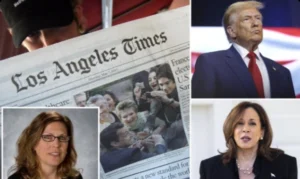 It’s reported that Vice President Kamala Harris has pulled off a surprising defeat in her 2024 presidential campaign. So, its billionaire owner, Patrick Soon-Shiong, banned the editorial board of the Los Angeles Times, a prominent daily newspaper in her home state of California, from endorsing her candidacy. The decision has drawn eyebrows and set up questions about Harris‘s campaign and the broader political landscape.
It’s reported that Vice President Kamala Harris has pulled off a surprising defeat in her 2024 presidential campaign. So, its billionaire owner, Patrick Soon-Shiong, banned the editorial board of the Los Angeles Times, a prominent daily newspaper in her home state of California, from endorsing her candidacy. The decision has drawn eyebrows and set up questions about Harris‘s campaign and the broader political landscape.
The Endorsement Controversy: Background
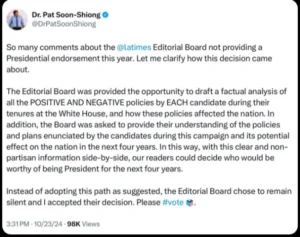 But the Los Angeles Times has strictly endorsed Democrats in every presidential election since 2008. But reports say Soon-Shiong intervened just as the editorial board was preparing to endorse Harris, precluding an endorsement from having been made. And it comes as tensions between media outlets rise over their endorsements and their effect on public opinion.
But the Los Angeles Times has strictly endorsed Democrats in every presidential election since 2008. But reports say Soon-Shiong intervened just as the editorial board was preparing to endorse Harris, precluding an endorsement from having been made. And it comes as tensions between media outlets rise over their endorsements and their effect on public opinion.
Such an important decision that determines who shall be endorsed by the editorial board also imbues it with such question marks — about the motivations, about internal conflicts within the Los Angeles Times, that its inability to endorse Harris can be said to reflect. Soon-Shiong made the decision, say sources familiar with the matter, because of worries about maintaining objectivity and refraining from controversy in the midst of a bitterly contested election cycle.
Harris’s Reaction
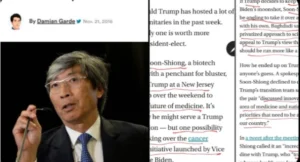
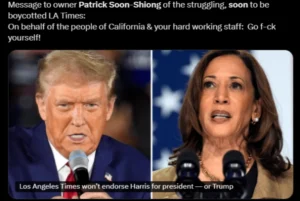 In line with her campaign message, Kamala Harris has pushed that message of unity and progress in response to the news. She has not personally commented on her endorsement situation, but her supporters have expressed frustration with the Los Angeles Times announcing which of the three was picked. Many see this as a wasted opportunity for Harris to gain some much needed momentum in her home state.
In line with her campaign message, Kamala Harris has pushed that message of unity and progress in response to the news. She has not personally commented on her endorsement situation, but her supporters have expressed frustration with the Los Angeles Times announcing which of the three was picked. Many see this as a wasted opportunity for Harris to gain some much needed momentum in her home state.
While Harris’s campaign has been known to focus on the most important issues, reproductive rights, healthcare access, and climate change. An endorsement by a major publication such as the Los Angeles Times could have lent visibility and credibility to an undecided voter that might have worked for her, her supporters say.
Media’s Role in Politics
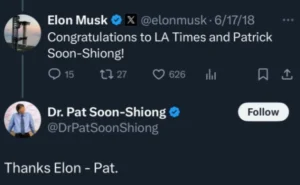 We can’t overstate the role of media endorsements in political campaigns. Respected publications can seriously affect the voter perceptions and decisions with their endorsements. This is within this context of the Los Angeles Times‘s decision not to endorse any candidate, which may have been a strategic play for that organization to remain neutral, but also risks alienating readers who expect traditional news purveyors to take clear stances.
We can’t overstate the role of media endorsements in political campaigns. Respected publications can seriously affect the voter perceptions and decisions with their endorsements. This is within this context of the Los Angeles Times‘s decision not to endorse any candidate, which may have been a strategic play for that organization to remain neutral, but also risks alienating readers who expect traditional news purveyors to take clear stances.
Within recent years, the media landscape has changed dramatically and is now very much under the scrutiny of whether or not news organizations handle endorsements and political coverage appropriately. Soon-Shiong’s decision to halt his endorsement process is part of broader trends in journalism, said, in which ownership dictates editorial policy.
Los Angeles Times Internal Conflicts
 Soon after his intervention, Mariel Garza, the editorial chief of the Los Angeles Times, quit in protest. She resigned in a letter calling silence in those critical times unacceptable for a newspaper historically on the side of important issues. Garza’s departure underscores internal disputes at the newspaper over exactly what direction its editorial page should take and its abiding commitment to journalistic standards.
Soon after his intervention, Mariel Garza, the editorial chief of the Los Angeles Times, quit in protest. She resigned in a letter calling silence in those critical times unacceptable for a newspaper historically on the side of important issues. Garza’s departure underscores internal disputes at the newspaper over exactly what direction its editorial page should take and its abiding commitment to journalistic standards.
Garza’s resignation is a signal of widespread worry among journalists about holding on to independence from influence from ownership. The current issue of the matter is related to how media organizations fulfill responsibilities towards the public and can stay true to their information duties when there are a lot of challenges in ownership.
Political Implications for Harris
This endorsement controversy goes beyond just Harris’s campaign. However, as she takes on powerful opponents in a crowded primary season, losing the support of important media outlets could handily derail her capacity to drum up voter enthusiasm.
This also may cause other media organizations to treat endorsements in future elections differently. As journalism continues to get attention on the potential ownership influence, publications might reconsider their approach to candidate endorsement or go slightly wimpier.
Public Sentiment and Voter Reactions
The Los Angeles Times decision has drawn mixed reaction from the public. Some readers are infuriated by what they see as a failure to back Harris, particularly in her capacity as first female vice president and the first woman of Black and South Asian ancestry to hold that office. They say that media outlets should act as neutrals, free of endorsing candidates.
Ahead of the elections in October, it’ll be essential for candidates like Harris — who make their rise on grassroots support and media visibility — to know what voters feel about these issues.
Looking Ahead: The 2024 Election Landscape
In the lead up to the 2024 elections, Kamala Harris will have to steer through this landmine field while still talking about what America should look like. Her campaign strategy also includes the absence of an endorsement from an iconic voice such as the Los Angeles Times.
To reach voters skeptical of a traditional media narrative, candidates will have to adapt their message and outreach efforts in a more media threads way. Being able to engage with constituents on social media, through town halls and community events will be necessary to build momentum into election day.
Conclusion
It’s a big moment in Kamala Harris‘s 2024 presidential campaign: the halting of an endorsement by the Los Angeles Times. In an environment that is more polarized by the day, when she is navigating this setback and other challenges, it’s critical that her campaign sticks with core issue areas that resonate with voters.
Finally, media endorsements — while important — do not guarantee awinning election: candidates need to appeal to voters directly. Kamala Harris will have to adjust to how the political playground has changed — and the way a candidate must navigate the media.
